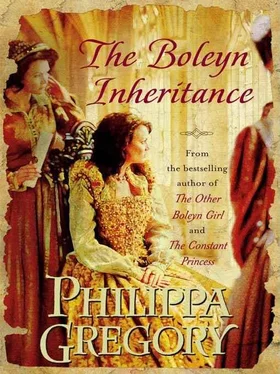“Good,” I say, smiling at her.
But her little face is not radiant as it was when she was playing with the kitten.
“I know it is good,” she says hesitantly. “I should be the happiest woman in the world. Like Jane Seymour, you know? Her motto was: ‘the most happy.’”
“You will have to become accustomed to life as a wife and Queen of England,” I say firmly. I really do not want to hear Katherine Howard’s regrets.
“I will,” she says earnestly. She is such a child, she still tries to please anyone who scolds her. “I really do try, Your Gr – er, Anne.”
Jane Boleyn, Hampton Court,
New Year’s Eve 1540
This is the court with two queens: nothing like it has ever been seen before. Those who had served Queen Anne, the now duchess, were glad to see her again, and glad to serve her. The warmth of her welcome surprised everyone, even me. But she always had a charm about her that made her servants glad to do any little thing for her; she was ready with her thanks and quick to reward. Madame Kitty, on the other hand, is quick to order and quick to complain, and she has an endless number of demands. In short, we have put a child in charge of the nursery, and she is making enemies of her little playmates as fast as she dishes out her favors.
The court was glad to see Queen Anne in her old place, and scandalized but fascinated that she should dance so merrily with Queen Katherine, that they should walk arm in arm, that they should ride out to hunt together, and that they should dine with their husband in common. The king smiled on them as if they were two favorite daughters, his pleasure was so indulgent, his satisfaction in this happy resolution so apparent. The duchess who had been queen had prepared her own way with some skill. She had brought great gifts for the new husband and wife, beautiful matching horses dressed in purple velvet: a kingly gift. She has, as it turns out now, exquisite manners: queenly manners. Under the strain of being the former wife at the first Christmas of the new wife’s court, Anne of Cleves is a model of tact and elegance. There is not a woman in the world who could have played the part with more discretion. And she is more remarkable for being the only woman, in the history of mankind, ever to do such a thing. Other women in the past may have stepped aside, or been forced out, the first queen of this very court for one – but no one has ever stepped graciously to one side as if it were a choreographed move in a masque, and gone on to dance her part in another place.
There was more than one man who said that if the king were not utterly besotted by a precocious child, he would be regretting his choice to put a silly girl in the place of this thoughtful, charming woman. And there was more than one prediction that said she would be well married before the year was out; for who could resist a woman who could fall from being queen to commoner and yet still carry herself as if greatness was within?
I was not one of those, because I think ahead. She has signed an agreement that says she was legally contracted to marry another man. Her marriage to the king was invalid, so would be her marriage to anyone else. He has tied her to spinsterhood for as long as the son of the Duke of Lorraine shall live. The king has cursed her with spinsterhood and infertility, and I doubt he has even considered this. But she is no fool. She will have considered this. She must have considered it a bargain worth making. In which case she is a stranger woman than any we have ever seen at court. She is a charming and graceful woman of only twenty-five years old, in possession of a large personal fortune, of unstained reputation, in her fertile years, and she has determined never to marry again. What a curious queen this one from Cleves has turned out to be!
She is in good looks. We now see that the plainness in her face and the pallor in her cheeks when she was queen were caused by the draining anxiety of being the fourth wife. Now that the fifth has taken her place we can see the young woman bloom, freed of the danger of privilege. She has used the time of her exile to improve herself. Her command of the language is much greater, and her voice, now that she is not struggling with the words, is mellow and clear. She is merrier, now that she can understand a witty remark, and now that she is lighter of heart. She has learned to play cards and to dance. She has outgrown her Cleves Lutheran strictness both in behavior and appearance. Her dress is beyond recognition! When I think how she came to this country dressed like a German peasant girl in layer after layer of heavy cloth, with a hood squashing her head and her body wrapped like a barrel of gunpowder, and now I see this fashionable beauty, I see a woman who has taken the freedom to remake herself. She rides with the king and talks seriously and interestingly with him about the courts of Europe and what the future holds for England, and she laughs with Katherine like another silly girl. She plays cards with the courtiers and dances with the queen. She is Princess Mary’s only true friend at court, and they read and pray together for a private hour every morning. She is the Lady Elizabeth’s only advocate, and she keeps a touching correspondence with her former stepdaughter and has been promised the role of guardian and beloved aunt. She is a regular visitor to Prince Edward’s nursery, and his little face lights up to see her. In short, Anne of Cleves behaves in every way as a beautiful and highly regarded royal sister should do, and everyone has to say that she is fit for the part. Indeed, many people say that she is most fit to be queen – but that is so much empty regret. At any rate, we are all now very glad that our evidence did not send her to the scaffold; though everyone praising her now would have sworn king’s evidence against her just as eagerly, had they been asked, as I was asked.
The duke summons me to his rooms on New Year’s Eve as if we should toast the past and make new resolutions together. He talks first of Queen Anne and how pleasantly she behaves herself at court. He asks me how Catherine Carey, my niece, Mary’s child, is serving as a maid-in-waiting to her cousin.
“She does her duty,” I say shortly. “Her mother has taught her well, I have very little to do with her.”
He allows himself a smirk. “And you and Mary Boleyn were never the best of friends.”
“We know each other well enough,” I say of my self-regarding sister-in-law.
“Of course she has the Boleyn inheritance,” he says, as if to remind me, as if I ever forget. “We could not save everything.”
I nod. Rochford Hall, my house, went to George’s parents at his death and from them to Mary. They should have left it to me, he should have left it to me; but no. I faced all the danger and the horror of what had to be done and ended up saving only my title and earning only my pension.
“And little Catherine Carey? Is she another queen in the making?” he asks, just to tease me. “Shall we have her schooled to please Prince Edward? Do you think we can put her in a king’s bed?”
“I think you will find her mother has already forbidden it,” I say coldly. “She will want a good marriage and a quiet life for her daughter. She has had enough of courts.”
The duke laughs and lets it go. “So what of our present passport to greatness: our queen, Katherine?”
“She is happy enough.”
“I don’t really care if she is happy or not. Does she show any sign of being with child?”
“No, none,” I say.
“How did she mistake before, in the first month of marriage? She had us all in hopes.”
“She can barely count,” I say irritably. “And she has no sense of how important it is. I watch her courses now; there will be no mistake again.”
Читать дальше
Конец ознакомительного отрывка
Купить книгу












